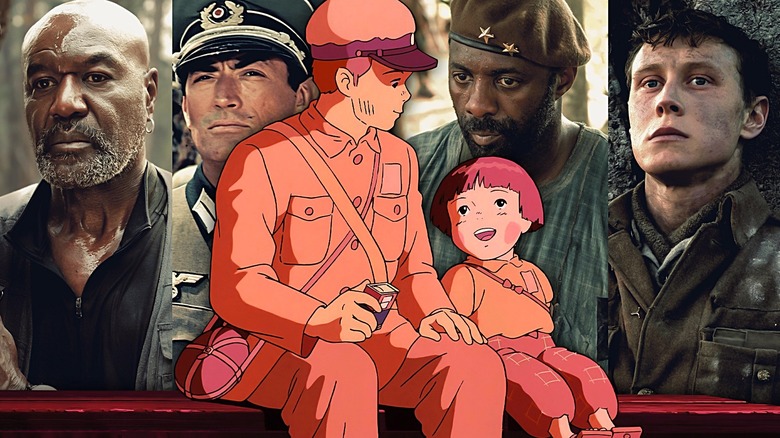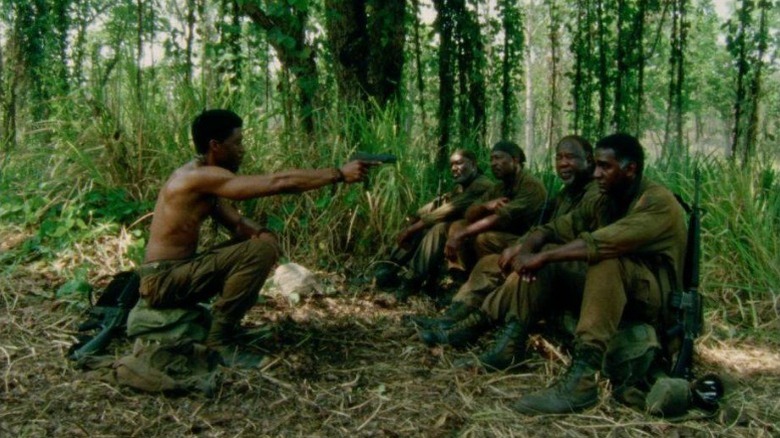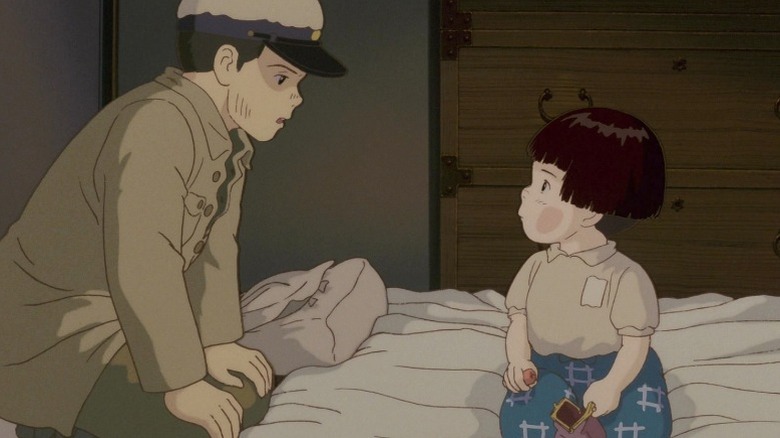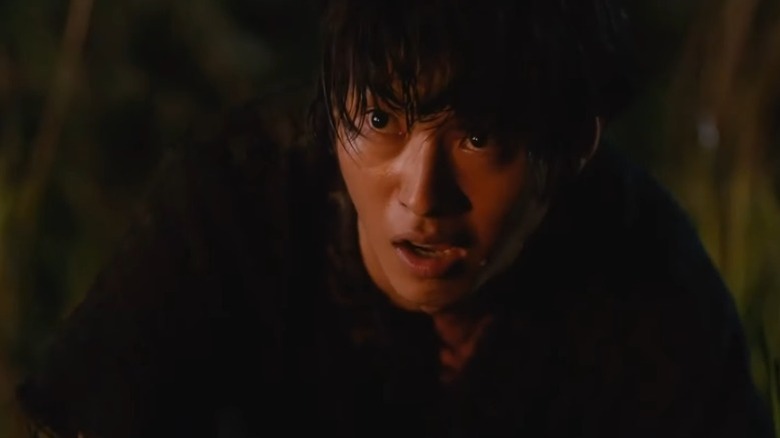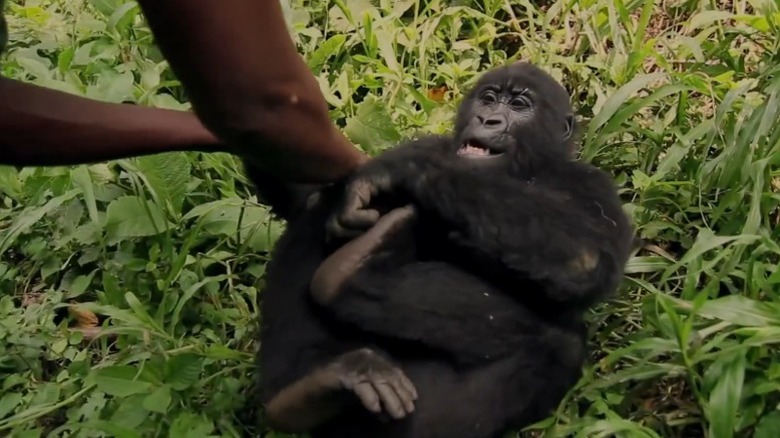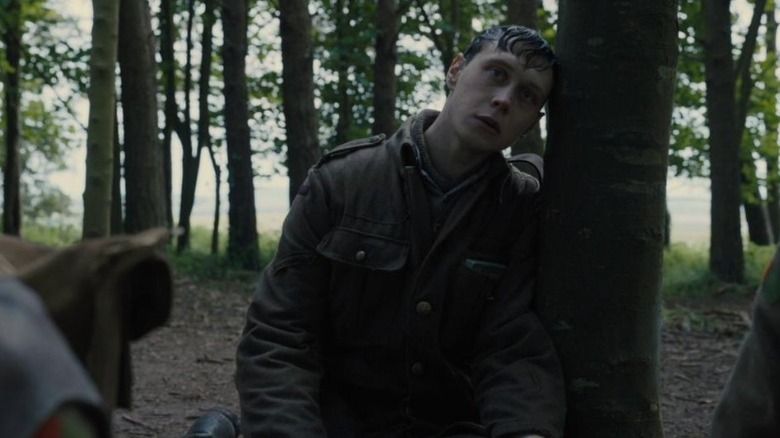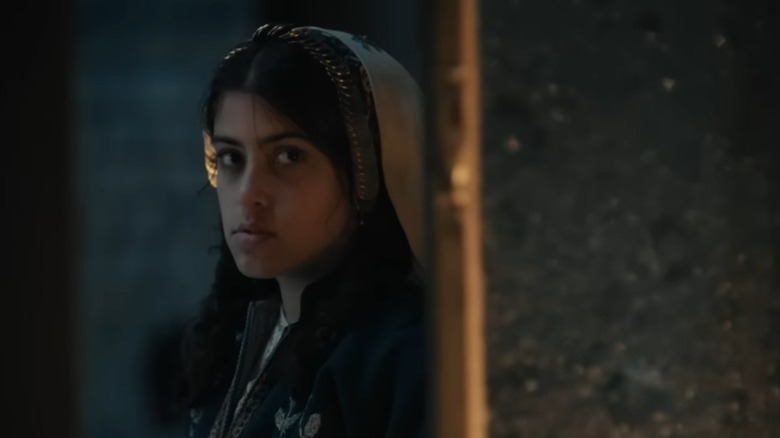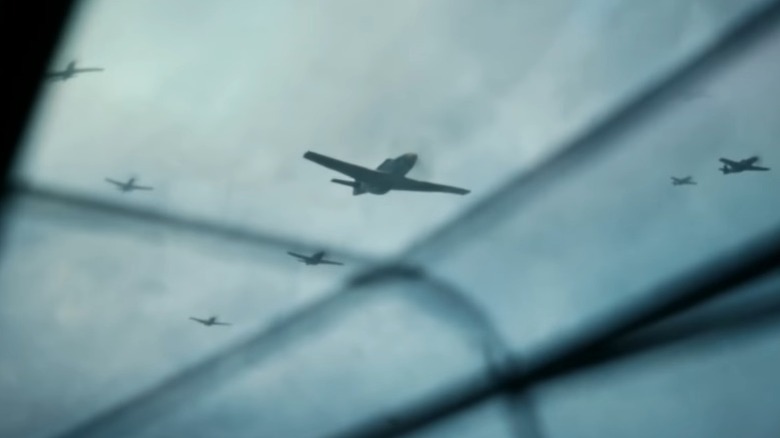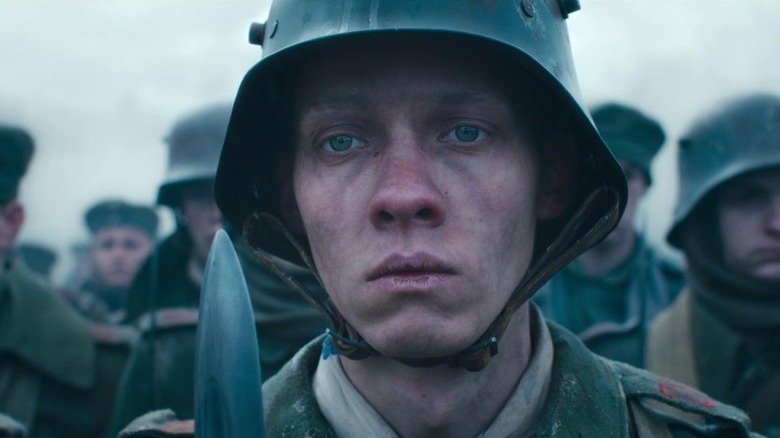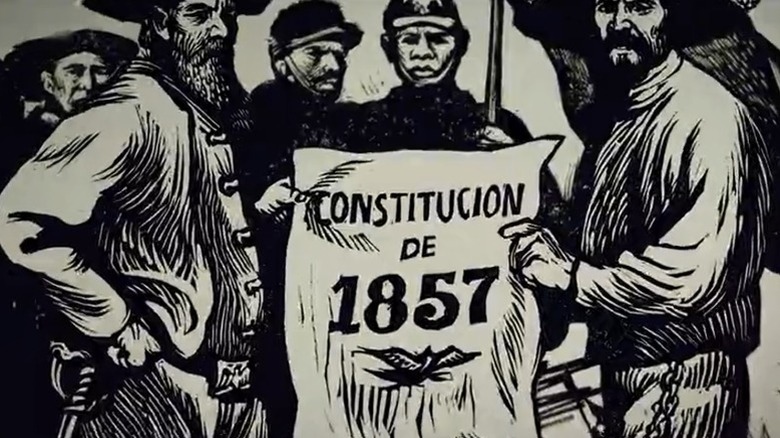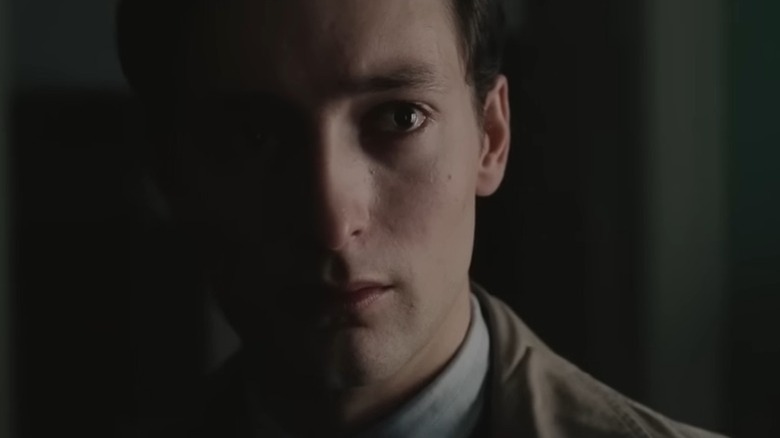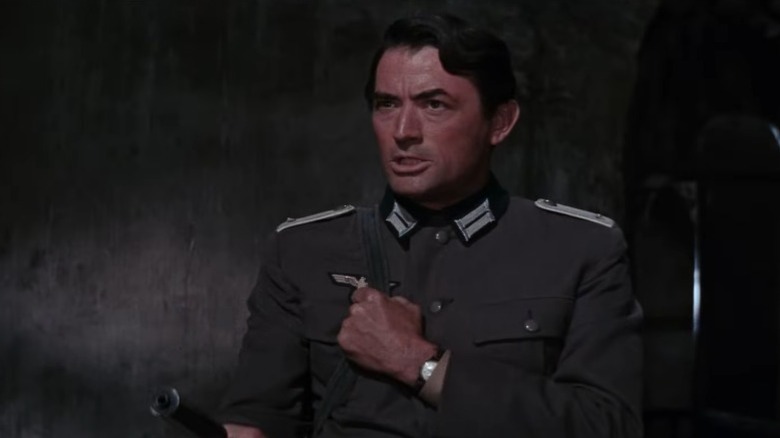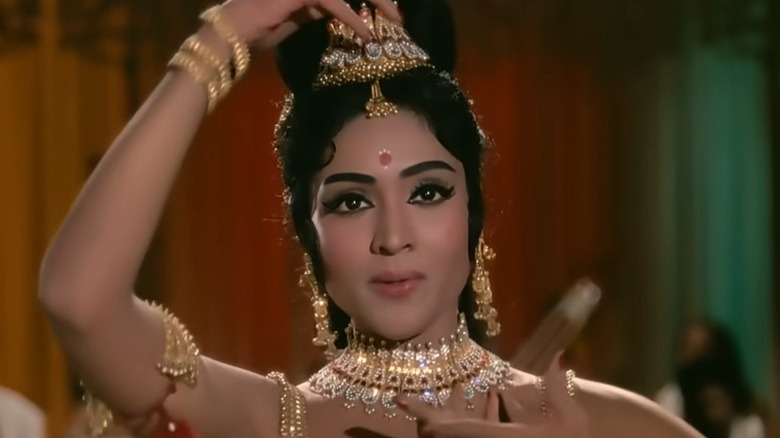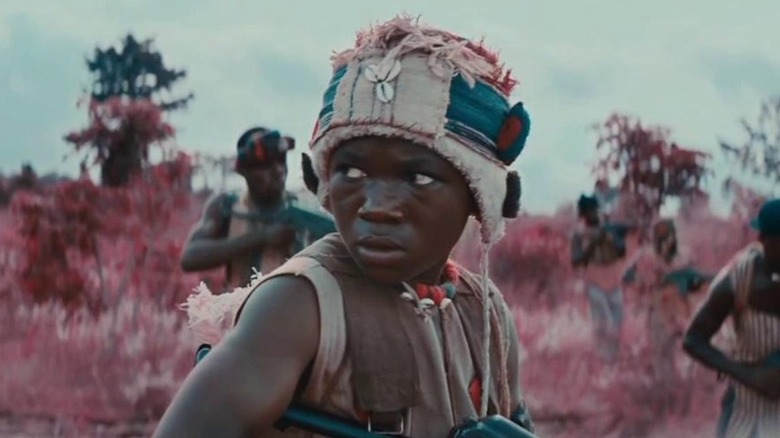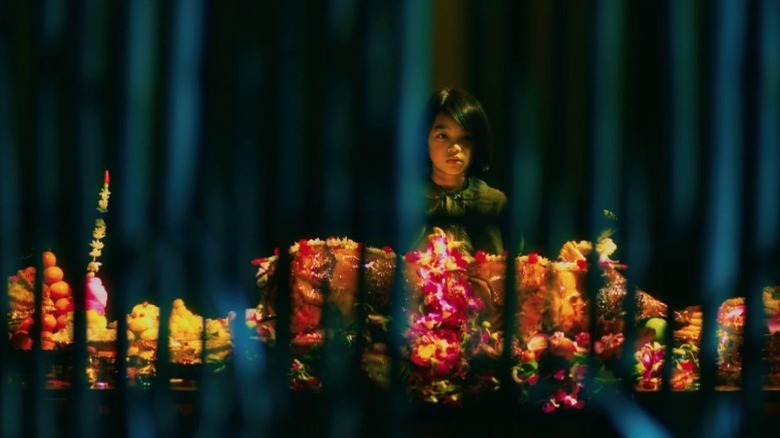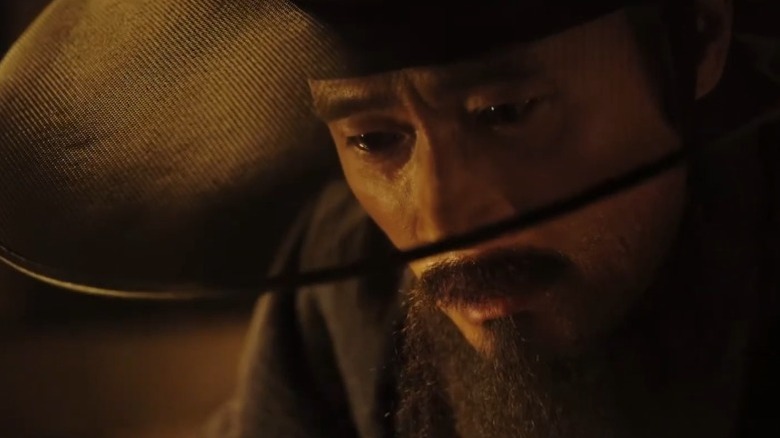The 15 Best War Movies Streaming On Netflix
We may receive a commission on purchases made from links.
The genre of war cinema has taken many forms over the decades ever since it sprung up into being alongside narrative cinema itself. Whether by exploring real historical and present-day conflicts or fictional ones, movies have time and again proven capable of mining the tension, violence, and unimaginably high stakes of war for pathos, action, and political critique.
Incidentally, Netflix has a solid roster of great war films from across the decades available to subscribers, and we've compiled a list of the best. Each of these movies concerns itself with real-life wars (four of them being World War II movies), although some tell wholly fictional stories within those frameworks. The two earliest-set among them take place in ancient India and China, while another looks at the Democratic Republic of the Congo in the early half of the 2010s. From everywhere across the centuries, here are the 15 best war movies streaming on Netflix.
Da 5 Bloods
35 years into his career, Spike Lee made a film that ranks among the most vital, ambitious, complex, and original of his career, directly tackling themes that most American directors wouldn't dare touch with a 10-foot pole. The film in question, "Da 5 Bloods," is also pretty high up on the list of best Netflix original films, even if its mid-2020, mid-pandemic release (revoltingly) kept it from receiving any attention at the Oscars aside from a single Best Original Score nomination for Terence Blanchard.
"Da 5 Bloods" follows four elderly Vietnam War veterans as they return to Vietnam to look for the remains of their late squad leader (played in flashbacks by Chadwick Boseman in one of his last film performances) and for a treasure they buried decades ago. As the strange ghosts of imperialism and the Vietnam War emerge, the film provides an opportunity for Lee to reckon with the intertwined legacies of colonialism, racism, and American warmongering — and finds him delving into all that and more with dramatic precision, surrealist flair, typically bold formal choices, and help from a truly phenomenal Delroy Lindo-led ensemble cast.
Grave of the Fireflies
One of the best anti-war movies of all time, Isao Takahata's "Grave of the Fireflies" is among the crowning achievements of Japanese cinema in the 20th century — a movie so charged with emotion and moral fortitude that it single-handedly puts the lie to the idea that animation is a less serious or just plain lesser medium.
Following young siblings Seita (Tsutomu Tatsumi) and Setsuko Yokokawa (Ayano Shiraishi) as they deal with the daily grind of merely trying to stay alive amid the war-torn ruins of Kobe at the tail end of World War II, the movie brilliantly and devastatingly employs the visual grace and splendor of Studio Ghibli's cel animation to paradoxically highlight the inhumanity of the circumstances heaped on its two child protagonists — both by the uncaring cruelty of the war itself, and by the insidious authoritarianism of midcentury Japanese society. It's one of the definitive cinematic statements about the lived reality of war, and, by the same token, one of the saddest movies ever made.
Kingdom
Anime adaptations of manga series are so commonplace that they're usually thought of as companion works, but live-action film adaptations of manga and anime are a different matter altogether. Such films are often among the most engrossing and beautifully-crafted blockbusters in Japanese cinema, as exemplified by 2019's "Kingdom" (not to be confused with the eponymous 2019 South Korean Netflix horror series).
Directed by Shinsuke Sato, the first live-action cinematic interpretation of the eponymous manga series by Yasuhisa Hara (and, naturally, of its anime adaptation) stars all Japanese actors and is told entirely in the Japanese language, but takes place in China — more specifically, in the Qin Dynasty during the notorious Warring States period. The script by Tsutomu Kuroiwa, Shinsuke Sato, and Yasuhisa Hara follows Li Xin (Kento Yamazaki), a war orphan who dreams of becoming a general, as he overcomes hardship to join the army of the Qin Dynasty founder himself, king Ying Zheng (Ryo Yoshizawa).
The plot, however, is pretty much just a starting point for a series of massive action set pieces and dazzling displays of fight choreography. It's not the deepest or most historically accurate movie in the world, but it's a guaranteed banging time for any fans of martial arts cinema, and the three sequels are equally worth watching.
Virunga
Directed by prolific British documentarian Orlando von Einsiedel, the 2014 film "Virunga" chronicles the efforts of four people — caretaker André Bauma, wardens Rodrigue Mugaruka Katembo and Emmanuel de Merode, and journalist Mélanie Gouby — to protect the world's last remaining mountain gorillas in the Virunga National Part, in the east of the Democratic Republic of the Congo.
Masterfully structured with blockbuster-like tautness and suspense, "Virunga" uses its human protagonists' stories as a window into the political and social turmoil of the Democratic Republic of the Congo in the early 2010s, with an emphasis on the M23 rebellion of 2012-2013, and the ways in which that turmoil jeopardized conservation efforts in the area. But everything in the movie goes back to the overwhelming natural beauty of Virunga and the poise and charisma of its endangered simian protagonists, who turn out to make eminently lovable and fascinating characters in their own right. It's one of the best documentaries ever.
1917
"1917" is one of the most impressive and mind-boggling formal experiments in all of 21st century cinema: An intimate, immersive, nose-to-the-ground portrait of what it was like to be a soldier in World War I, captured entirely in two unbroken long takes of unfathomable scope and complexity. Inspired by real war stories told to director Sam Mendes by his grandfather Alfred Mendes, the film focuses on two British soldiers (George MacKay and Dean-Charles Chapman) who are given a mission to cross no man's land in order to deliver a crucial message calling off an impending attack.
It's a simple setup carried by sheer formal panache, and that's more than enough to sustain "1917" for its entire duration. While the film is a bit politically and morally muddled and sometimes veers in the direction of glamorizing war as a high-octane action movie experience, the accomplishment of Mendes and his cast and crew is undeniable and nigh-irresistible, and it's no surprise "1917" won three Oscars. Just the amount of emotion and character specificity that MacKay is able to impart to what is essentially a two-hour choreographed dance number is enough to leave a lasting impression.
Farha
For all the discussion about the Israel-Palestine conflict that currently dominates news cycles on the daily, it's rare that commentators look back on how the conflict began, all the way back in 1948, during the displacement of Palestinians by Zionist militias and later official Israeli armed forces. The 2021 film "Farha," written and directed by Jordanian filmmaker Darin J. Sallam (whose own family fled Palestine in 1948), takes that displacement process as a primary subject, condensing its vast scope into the illustrative story of Farha (Karam Taher), a 14-year-old Palestinian girl whose life is rapidly and dramatically upended by the Nakba.
Sensitive, observant, and profoundly moving, "Farha" moves rapidly from the establishment of Farha's everyday life in a small Palestinian village — where she dreams of one day moving to the big city and getting an education — to the disruption brought on by the Zionist paramilitaries. In the process of escaping, Farha ultimately finds herself locked in a cellar for safety, observing the violence and repression outside through a slit in the wall, making for a sparse, taut setup that "Farha" fashions into a duly harrowing document of the horrors faced decades ago by thousands in Farha's situation.
The Shadow in My Eye
Written and directed by Ole Bornedal, the Danish film "The Shadow in My Eye" (also sometimes known as "The Bombardment") dramatizes Operation Carthage, a 1945 British air raid on German-occupied Copenhagen that successfully wrecked Gestapo operations in Denmark yet also resulted in over 100 civilian deaths due to the mistaken targeting of a school. This shameful episode in British military history is given due tragic weight by the film, which sometimes borders on horror in its evocation of the sheer suffocating agony of war.
"The Shadow in My Eye" is largely structured as an ensemble piece, tracking the ways in which the lives of various disparate residents of Copenhagen intersect in the dark, fraught days leading up to the raid. The film particularly emphasizes the environment of Institut Jeanne d'Arc, the French-language Catholic school that got ultimately caught in the crossfire, as a microcosm of the tensions and dilemmas plaguing the lives of Danish citizens more broadly during World War II. This complex weaving of themes and narratives makes for a heady, unsparing drama that's as tough to watch as it is sobering and vital.
All Quiet on the Western Front (2022)
Winner of four Academy Awards, 2022's "All Quiet on the Western Front" marked the big first crossover of German-born director Edward Berger into mainstream Hollywood success, a path he'd continue to chart two years later with 2024's "Conclave." One of the biggest-ever Netflix original movies, "All Quiet on the Western Front" acts as both a new adaptation of the eponymous 1929 novel by Erich Maria Remarque and a de-facto remake — this time actually in German — of the novel's classic, Best Picture-winning 1930 adaptation.
Much like the novel, Berger's film follows the rude awakening of a group of young German soldiers who have their illusions of heroism shattered by the brutal reality of the World War I trenches — with particular emphasis on the idealistic Paul Bäumer (Felix Kammerer). Berger, who wanted to make a different kind of war film, intercuts the increasingly desperate efforts for survival of Paul and his friends with the maddening, Kafkaesque armistice negotiations between European state bureaucrats. It's a framing that allows the movie to both drive home how painful, unglamorous, and traumatizing the reality of war is, and comment on the political and moral grotesquerie of the way it's foisted upon the young.
Patria
A hidden gem of the war genre available on U.S. Netflix is the 2019 Mexican documentary "Patria." Despite its relative obscurity outside of Mexico, the movie is crucial viewing for history enthusiasts. It's a thorough, persuasive, deeply informative essay film about the intricacies of the Mexican conservative-liberal conflicts of 1854-1867 and the shadow they still cast over Mexico and the world to this day.
Based on the eponymous three-part novel series by Spanish-Mexican writer Paco Ignacio Taibo II, "Patria" is structured as an audiovisual transliteration of Taibo's sharp observations on La Reforma, the liberal Constitution of 1857, the French intervention and Franco-Mexican war of 1867, the short-lived Second Mexican Empire, and numerous other aspects of one of the most turbulent and transformative periods in all of Mexican history. Despite the veritable barrage of information, Taibo and director Matías Gueilburt carry it all through with nimbleness, charisma, and a healthy dose of humor. At just 89 minutes, it's got the feel of a particularly enthralling video essay with cinematic production values, and it's absolutely one of the most enriching and fascinating things you can cue up on Netflix.
Number 24
Directed by John Andreas Andersen, the 2024 Norwegian film "Number 24" is the best movie you probably didn't watch on Netflix. It tells the real-life story of Gunnar Sønsteby, a.k.a. Number 24, an agent in the Norwegian resistance movement against German occupation during World War II. Originally an ordinary Norwegian civilian, Sønsteby (played by Sjur Vatne Brean as a young man and Erik Hivju as an elder in the film) immediately endeavored to fight against the occupation in 1940 by any means possible. With that spirit, he eventually became the mastermind behind the notorious sabotage group that became known as the Oslogjengen (Oslo Gang).
"Number 24" offers a largely straightforward and no-frills telling of Sønsteby's time during the war, and of the various dangerous missions he carried out along with the rest of the Oslogjengen. Gripping and handsomely-made, the movie positions resistance operations as a dangerous and draining yet noble and necessary struggle. By artfully modulating tension and drama, Andersen and writers Erlend Loe and Espen Lauritzen von Ibenfeldt manage to make a ground's view of World War II rousing and entertaining without shortchanging the horror, moral gravity, and political weight of the history at hand.
The Guns of Navarone
Speaking of movies that manage to successfully draw rousing and suspense-filled entertainment from the World War II struggle against the Nazis, "The Guns of Navarone" is a rare example of an older classic available to Netflix subscribers, and any fan of war movies who hasn't seen it yet is doing themselves a disservice.
Directed by J. Lee Thompson from a script by Carl Foreman based on the eponymous novel by Alistair MacLean, "The Guns of Navarone" brings the same muscular gamesmanship that Thompson displayed in his various other midcentury works — also including "Conquest of the Planet of the Apes," "Ice Cold in Alex," "Yield to the Night," and the original "Cape Fear" — to the war fiction genre. Gregory Peck (in one of his best movies), David Niven, and Anthony Quinn star in a story about an Allied commando unit sent into the impenetrable Nazi-controlled island of Navarone to destroy the two massive large-caliber guns preventing the rescue of 2,000 marooned British soldiers. It's a vintage men-on-a-mission setup that the 1961 movie explores with maximum aplomb.
Amrapali
Another great older classic available on the Netflix catalog is the 1966 Hindi-language Indian film "Amrapali." Directed by prolific Bollywood filmmaker Lekh Tandon, "Amrapali" takes place in the ancient kingdom of Magadha during the conquest campaign of Maharaja Ajatashatru (Sunil Dutt). As the movie starts, Maharaja Ajatashatru has successfully laid claim over the entire region except for the city of Vaishali. Unquenchable and unstoppable in his thirst for power, Ajatashatru recklessly marches his exhausted troops into Vaishali and suffers a humbling defeat, prompting him to disguise himself as a Vaishali soldier and infiltrate the city. It is then that he meets and falls in love with Amrapali (Vyjayanthimala), which makes him to question his entire belief system.
Although not especially faithful to the real-life historical record of Ajatashatru and Amrapali, "Amrapali" contains some of the most stirring action, romance, high drama, and music that '60s Bollywood cinema has to offer, as well as a startlingly direct and incisive message about the foolishness of war and the ugliness of warmongering. It's the kind of hidden Netflix gem that should by all accounts be much better-known among Westerners, so get on it as soon as you can.
Beasts of No Nation
In 2015, Cary Joji Fukunaga's "Beasts of No Nation" made history as the first Netflix original non-documentary "prestige" title. Acquired by the streamer for $12 million, the movie made the Venice Film Festival main competition lineup and received numerous accolades during the year-end award season, with help from a massive Netflix campaign push. All brand management aspirations aside, though, what remains years later is that "Beasts of No Nation" is an excellent film, and it's still very much worth the watch, despite the relative lack of fanfare around it in the years since.
Abraham Attah (whose searing performance earned him the Marcello Mastroianni award for emerging actors at Venice) stars as Agu, a young boy from a village in an unnamed West African country. Caught in the middle of a violent civil war, Agu winds up joining a rebel faction as a child soldier, under the guidance of the charismatic yet cruel Commandant (Idris Elba). With unflinching vérité cinematography and blunt narrative acuity, the movie — adapted from the eponymous 2005 novel by Nigerian-American author Uzodinma Iweala — paints an achingly empathetic portrait of lost innocence amid an oft-overlooked social crisis, and stands among the strongest anti-war statements of 21st-century cinema.
First They Killed My Father
The fifth and best directorial effort from Angelina Jolie, who has steadily been building a career as one of the most consistent and impassioned war film helmers of the 21st century, the American-Cambodian co-production "First They Killed My Father" adapts the memoir by Loung Ung. With a script co-written by Jolie and Ung, the film dramatizes the real-life story of how a five-year-old Loung (Sareum Srey Moch) survived through the first year of the Khmer Rouge government in 1975 Cambodia, in the process being separated from her family and recruited as a child soldier in the skirmishes against Vietnam that would eventually lead to the Cambodian-Vietnamese War.
Firmly steeped in Loung's child's eye view of the era's political turmoil and overwhelming violence, "First They Killed My Father" is one of the hardest movies to watch on this list — a candid, unembellished first-person account of how one of the 20th century's most brutal and repressive regimes was experienced by someone too young to understand what was happening around her.
The Fortress (2017)
One of several excellent movies written and directed by Hwang Dong-hyuk before he created "Squid Game" for Netflix, 2017's "The Fortress" is a war drama that concerns itself directly with a moral impasse seldom explored by films of its ilk: The question of whether or not to surrender. Based on the 2007 novel "Namhansanseong" by Kim Hoon, the movie takes place during the 1636 Qing invasion of Korea, when a rising Chinese dynasty mounted an assault on the kingdom of Joseon and demanded that it sever ties with the Ming dynasty.
"The Fortress" is largely structured as a siege film, specifically depicting the retreat of King In-jo (Park Hae-il) and his court into the snowy fortress of Namhansanseong as they butt heads over how to respond to the Qing dynasty's invasion. Much like Hwang's most famous work, it's a movie that knows how to wring tension, dynamism, depth, and character texture from a claustrophobic closed-quarters predicament in which everybody's survival hangs in the balance. And, on top of that, it's just a lush, gorgeously shot period film, featuring a dazzling late-period score by none other than Ryuichi Sakamoto.
